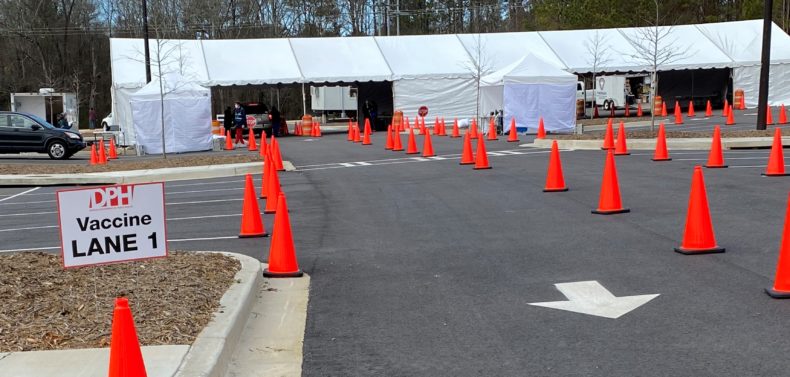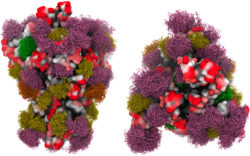The pandemic in Athens still shows few signs of improving. If anything, things are getting worse with further community spread.
Athens-Clarke County topped 10,000 cases late last week. Data from the Department of Public Health showed that, as of Jan. 19, there have been 10,231 confirmed cases via viral tests and 1,808 positive antigen tests, for a total of 12,239 cases—approximately 10% of the population. The data also shows a total of 357 hospitalizations and 78 confirmed deaths, with three additional deaths listed as probable. The seven-day rolling average of new cases was 80, down from 108 a week ago, though that may attributable to the three-day MLK weekend.
Despite a recent decline in positive tests, the overall increase in cases and hospitalizations in Athens and the surrounding counties that utilize local hospitals over the past several months has meant continued stress on Athens hospitals. Eighty-eight ICU beds were in use, outstripping the normal capacity of 70. Statewide, ICU bed capacity is at 91%. Regular inpatient bed space occupied rose to over 100% with 634 of 621 beds in use. COVID-19 patients made up 43% of all hospitalizations in Region E, with 273 people hospitalized for COVID-19 as of Jan. 15.
Need further proof that COVID-19 is widespread among our community? Look no further than this week’s wastewater data from Dr. Erin Lipp and the Center for the Ecology of Infectious Diseases (CEID). According to the most recent data from Jan. 11, the total viral load increased by five-fold compared to levels measured the week prior and reached “the highest recorded total viral load through the course of this study.” While the rate of increase and total load are similar to trends seen in August when the UGA fall semester started, the data also notes that “these results may reflect an accelerated rate of new infections, the increase in population with the arrival of students, or both.”
The promise of the vaccine and its distribution provides some hope, but the slow rollout continues to be mired with snags and logistical issues—including the lack of a statewide scheduling tool for DPH health districts and delays in getting more of the vaccine into the hands of providers.
At a Jan. 12 Athens-Clarke County Commission work session, Northeast Health District Director Stephen Goggans gave commissioners further perspective on how vaccine distribution is shaping up and what to expect in the next six weeks.
The new dual testing and vaccination drive through the DPH site in Athens, located at 355 Oneta St. just off of Chase Street, is set up to provide vaccinations. In five weeks’ time, Goggins said, there should be 23 sites, via public and private providers, set up across the county to administer vaccinations. Goggans said they expect to have the capacity to administer at least 4,000 vaccinations a week, perhaps up to 4,700.
As of Jan. 15, Clarke County had administered approximately 4,000 vaccinations in this phase to those who qualify. Statewide, Georgia has administered 368,379 shots.
At an event last week for reporters to tour the new testing and vaccination site, Northeast Health District Clinic Manager and COVID-19 Public Information Officer Sarah Peck said the real holdup at this point is actually getting ahold of more of the vaccine. “We’re walking a fine line. We want the public to know that we’re here at this new site, but we’ve got limited supply, and the demand is high,” she said.
Jennifer Chastain, a public health nurse at the new vaccine site, said the site has been running smoothly so far. “Personally, I have faith in the vaccine, and we’re all so excited to be able to provide this service to the community,” she said.
One other problem that’s been seen statewide is the lack of any online system for scheduling, but GDPH should be releasing a scheduling tool that all health districts and health departments can use in the coming days. This should cut down on the wait times for those trying to schedule via telephone.
“With testing, once we had better online scheduling, the call center was much more functional,” Goggins told commissioners. “I know it’s hard to ask constituents to be patient, but things really are growing, and I think you’ll see the impacts of that really quickly, just in terms of the numbers that are administered and how people are reached.”
In the briefing to the commission, public health officials encouraged any private providers who’d like to sign up to give vaccines to reach out for help in navigating their way through that process. A look at the current list of providers signed up shows that the task may be proving daunting or too complicated and time-consuming for smaller primary practices.
Beyond DPH offering the vaccine, UGA also began administering the vaccine to faculty and staff over age 65. UGA also sent out an email and survey to the university community late last week as they developed a plan to vaccinate the entire UGA campus community—faculty, staff and students. The survey asked respondents about their age and health conditions broadly, whether they were planning on receiving the vaccine at UGA and if they’ve already received the vaccine.
The Biden administration’s plan, announced last week, will provide assistance, but any help from the top down may still take a while to reach our local community. For now, it’s more important than ever to follow public health guidelines. As Goggans told the commission last week, “The thing that’s going to help this surge is continued public health measures.”
Like what you just read? Support Flagpole by making a donation today. Every dollar you give helps fund our ongoing mission to provide Athens with quality, independent journalism.










